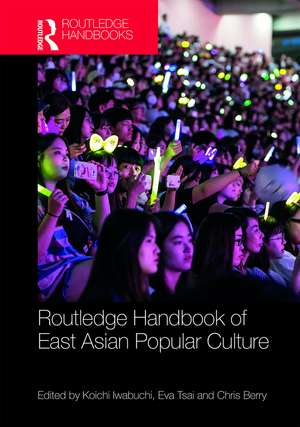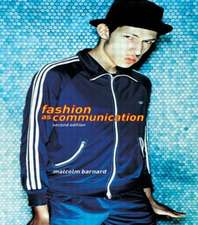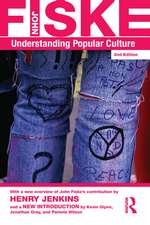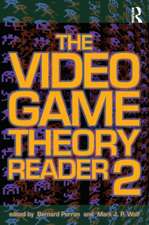Routledge Handbook of East Asian Popular Culture
Editat de Koichi Iwabuchi, Eva Tsai, Chris Berryen Limba Engleză Hardback – 28 noi 2016
As East Asian popular culture becomes a global force, it is increasingly important for us to understand the characteristics of contemporary East Asian popular culture, and in particular its transnational nature. In this handbook, the contributors theorize East Asian experiences and reconsider Western theories on cultural globalization to provide a cutting-edge overview of this global phenomenon.
The Routledge Handbook of East Asian Popular Culture will be of great interest to students and scholars of a wide range of disciplines, including: Cultural Studies, Media Studies, Communication Studies, Anthropology, Sociology and Asian Studies in general.
| Toate formatele și edițiile | Preț | Express |
|---|---|---|
| Paperback (1) | 417.20 lei 6-8 săpt. | |
| Taylor & Francis – 30 iun 2020 | 417.20 lei 6-8 săpt. | |
| Hardback (1) | 1241.67 lei 6-8 săpt. | |
| Taylor & Francis – 28 noi 2016 | 1241.67 lei 6-8 săpt. |
Preț: 1241.67 lei
Preț vechi: 1877.75 lei
-34% Nou
Puncte Express: 1863
Preț estimativ în valută:
237.59€ • 248.06$ • 196.64£
237.59€ • 248.06$ • 196.64£
Carte tipărită la comandă
Livrare economică 05-19 aprilie
Preluare comenzi: 021 569.72.76
Specificații
ISBN-13: 9780415749428
ISBN-10: 0415749425
Pagini: 308
Ilustrații: 38
Dimensiuni: 174 x 246 x 23 mm
Greutate: 0.69 kg
Ediția:1
Editura: Taylor & Francis
Colecția Routledge
Locul publicării:Oxford, United Kingdom
ISBN-10: 0415749425
Pagini: 308
Ilustrații: 38
Dimensiuni: 174 x 246 x 23 mm
Greutate: 0.69 kg
Ediția:1
Editura: Taylor & Francis
Colecția Routledge
Locul publicării:Oxford, United Kingdom
Public țintă
Postgraduate and UndergraduateCuprins
Introduction: Critical approaches to East Asian pop culture
Part I: Historicization and Spatialization of East Asian pop culture
1. Historicizing East Asian Pop Culture,
2. East Asian popular culture and inter-Asian referencing
3. Hybridity, Korean Wave and Asian Media
4. Been informal and formal cultural economy: Chinese subtitle groups and flexible accumulation in the age of online viewing
5. Digital Diaspora, Mobility and Home
Part II: The development of national production and its regional circulation/connection
6. Films
6a. Ways of S. Korean Cinema: Phantom, Trans –Cinema and Korean Blockbusters
6b. Welcome to Chollywood: Chinese Language Cinema as a Transborder Assemblage
6c. Globalism, New Media, and Cinematically Imagining the Inescapable Japan
7. TV dramas
7a. Bordercrossing, Local Modification and Transnational Transaction of TV Dramas in East Asia
7b. Confucian Heroes in Popular Asian Dramas in the Age of Capitalism
8. Pop Music
8a. K-pop, the Sound of Subaltern Cosmopolitanism?
8b. The legendary live venues and the changing music scenes in Taipei and Beijing: Underworld and D22
9. Social media and popular activism 9a. Social Media and Popular Activism in a Korean Context
9b. Mobilizing Discontent: Social Media and Networked Activism since the Great East Japan Earthquake
9c. Social media in China: between an emerging civil society and commercialization
View III: Gender. Sexuality and Asian celebrity
10. East Asian stars, - public space and star studies
11. Ribbons and Frills: Shōjo Sensibility and the Transnational Imaginary
12. Queer Pop Culture in the Sinophone Mediasphere
13. Male and Female Idols of the Chinese Pornosphere
14. Soft, Smooth with Chocolate Abs: Performance of a Korean Masculinity in Taiwanese Men’s Fashion
Part IV: Politics of the commons
15. Shanzhai culture, Dafen art and Copyrights
16. Regional soft power/creative industries competition
17. Popular Culture and Historical Memories of War in Asia
18. Film Festivals and Regional Cosmopolitanism in East Asia: the case of Busan International Film Festival
19. Trans-East-Asia as method
Part I: Historicization and Spatialization of East Asian pop culture
1. Historicizing East Asian Pop Culture,
2. East Asian popular culture and inter-Asian referencing
3. Hybridity, Korean Wave and Asian Media
4. Been informal and formal cultural economy: Chinese subtitle groups and flexible accumulation in the age of online viewing
5. Digital Diaspora, Mobility and Home
Part II: The development of national production and its regional circulation/connection
6. Films
6a. Ways of S. Korean Cinema: Phantom, Trans –Cinema and Korean Blockbusters
6b. Welcome to Chollywood: Chinese Language Cinema as a Transborder Assemblage
6c. Globalism, New Media, and Cinematically Imagining the Inescapable Japan
7. TV dramas
7a. Bordercrossing, Local Modification and Transnational Transaction of TV Dramas in East Asia
7b. Confucian Heroes in Popular Asian Dramas in the Age of Capitalism
8. Pop Music
8a. K-pop, the Sound of Subaltern Cosmopolitanism?
8b. The legendary live venues and the changing music scenes in Taipei and Beijing: Underworld and D22
9. Social media and popular activism 9a. Social Media and Popular Activism in a Korean Context
9b. Mobilizing Discontent: Social Media and Networked Activism since the Great East Japan Earthquake
9c. Social media in China: between an emerging civil society and commercialization
View III: Gender. Sexuality and Asian celebrity
10. East Asian stars, - public space and star studies
11. Ribbons and Frills: Shōjo Sensibility and the Transnational Imaginary
12. Queer Pop Culture in the Sinophone Mediasphere
13. Male and Female Idols of the Chinese Pornosphere
14. Soft, Smooth with Chocolate Abs: Performance of a Korean Masculinity in Taiwanese Men’s Fashion
Part IV: Politics of the commons
15. Shanzhai culture, Dafen art and Copyrights
16. Regional soft power/creative industries competition
17. Popular Culture and Historical Memories of War in Asia
18. Film Festivals and Regional Cosmopolitanism in East Asia: the case of Busan International Film Festival
19. Trans-East-Asia as method
Notă biografică
Koichi Iwabuchi is a Professor & Director of Monash Asia Institute, Monash University, Australia.
Eva Tsai is an Associate Professor at National Taiwan Normal University, Taiwan.
Chris Berry is a Professor of Film Studies at King's College London, UK.
Eva Tsai is an Associate Professor at National Taiwan Normal University, Taiwan.
Chris Berry is a Professor of Film Studies at King's College London, UK.
Descriere
Since the 1990s there has been a increase in cultural flows and connections between the countries in the East Asian region. Uneven but multilateral exchanges of Japanese, Korean, Taiwanese, and Chinese products have led to the construction of an ‘East Asian Popular Culture’. This is both influenced by, and in turn influences, the national cultures, and generates transnational co-production and reinvention. As East Asian popular culture becomes a global force, it is important to understand its characteristics - particularly its transnational nature. Contributors explore East Asian experiences and reconsider Western theories on cultural globalization.













